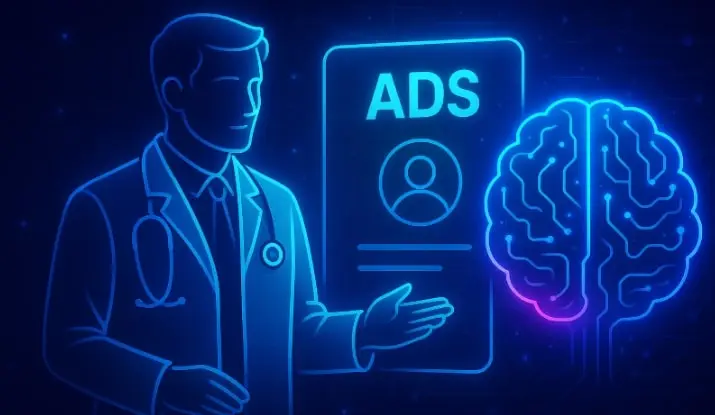Healthcare advertising has always walked a fine line. On one side, there is the need to share clear and accurate information. On the other, there is pressure to promote services in a way that doesn’t feel pushy or insincere. Patients pay close attention to how medical information is presented, and trust is everything. This is where AI ads in healthcare come into play. With the right approach, artificial intelligence can help providers communicate effectively, build trust, and still deliver measurable results.
So here’s the big question: can technology actually make healthcare ads more trustworthy? Let’s take a closer look.
Empathy and Accuracy Together
Think about the last healthcare ad you came across. Maybe it was for a new hospital wing, a wellness program, or a telehealth service. Did it feel informative, or did it sound more like a generic sales pitch? Patients do not want to feel like they are being marketed to when their health is on the line. What they want is clarity, empathy, and reassurance.
Here is the issue. Many traditional healthcare ads struggle to get this balance right. If an ad leans too heavily on complex medical terms, it overwhelms people. If it focuses too much on feel-good slogans, it risks coming across as insincere. Either way, trust takes a hit. And in healthcare, trust is the foundation of every decision a patient makes.
Why Patients Distrust Overly “Salesy” Healthcare Ads
The healthcare industry is not like fashion or consumer electronics. A phone or a pair of shoes can be marketed with flashy taglines. Healthcare simply cannot. Patients are quick to notice when an ad is more about boosting profits than providing support.
That is why overly promotional ads often backfire. Instead of inspiring confidence, they create skepticism. This is where AI-powered ads change the dynamic. Unlike traditional campaigns that rely on guesswork, AI ads use real data to understand what patients care about most. They can create messaging that is both accurate and compassionate.
How AI Ads Build Trust in Healthcare
So how do AI ads actually solve this problem? The secret lies in data, personalization, and compliance.
- Listening to Patient Concerns
AI can scan thousands of patient surveys, search queries, and feedback forms to find out what people are really asking. Instead of guessing what matters most, ads can be shaped around the actual concerns patients express.
- Speaking to Different Demographics
A young adult searching for fitness advice will not respond to the same messaging as a senior managing chronic illness. AI ads can segment audiences with precision and adapt the tone accordingly. The result is advertising that feels more like a thoughtful conversation than a sales pitch.
- Maintaining Compliance
Regulations in healthcare exist for a reason. AI helps ensure campaigns stay compliant while still engaging. That means fewer risks of misleading claims and more opportunities to earn patient confidence.
- Scaling Empathy
Perhaps the most powerful part is how AI allows empathy to scale. Instead of pushing out one broad message to everyone, providers can send personalized, compassionate ads to thousands of people at once. That is how meaningful trust is built.
Examples of AI Ads in Action
These ideas sound good in theory, but what does it look like in practice? Here are a few real-world examples.
- Appointment Reminders
Missed appointments cost healthcare providers huge amounts every year. AI-powered reminders can reach patients with personalized messages about date, time, and preparation steps. These reminders feel helpful rather than intrusive.
- Wellness Campaigns
Preventive care often gets overlooked until it is too late. AI ads can promote flu shots, healthy lifestyle programs, or seasonal checkups in ways that connect directly with the patient’s life stage and habits.
- Telehealth Awareness
Telehealth has become common, but many patients still feel unsure about how it works. AI campaigns can address concerns for older audiences, such as security, while emphasizing convenience for younger patients.
- Medication Reminders
Keeping patients on track with prescriptions is a constant challenge. AI ads can provide timely nudges through SMS, email, or social platforms, helping patients stay consistent with treatment plans.

Why AI Ads Outperform Traditional Campaigns
Traditional healthcare advertising has leaned on broad methods like TV commercials, print ads, or billboards. While these approaches still matter, they lack precision.
AI ads offer something different. Messages are tailored instead of generic. Campaigns can evolve in real time based on patient engagement. Most importantly, ads reinforce trust by staying relevant, accurate, and empathetic.
Instead of just delivering information, AI ensures the right message reaches the right person at the right moment.
The Ethical Side of AI in Healthcare Ads
Of course, any conversation about AI brings up ethics. In healthcare, the stakes are even higher. Patients deserve honesty. Technology should never be used to manipulate.
So can AI ads be trusted? The answer depends on how they are designed. When used responsibly, AI empowers patients by providing accurate information and addressing concerns with care. If used irresponsibly, however, it can cross the line into exploitation.
The key is transparency. AI ads in healthcare should always aim to inform, not to frighten or mislead.
Can Technology Really Build Trust?
At first, it might sound odd to think of technology as a tool for building trust in healthcare. Technology is often blamed for making communication feel less human. Yet in reality, AI ads are proving the opposite.
By analyzing real concerns, tailoring messages, and ensuring compliance, AI allows healthcare providers to connect with patients in ways that feel genuine and compassionate.
Trust is not built in a single ad or overnight. It comes from consistency, empathy, and honesty over time. With the right tools, healthcare providers can scale this approach and make patients feel cared for.
So yes, technology can build trust in healthcare advertising, as long as it is used with responsibility and care. Platforms like Quickads are making this possible, helping providers create AI ads that reassure, inform, and empower patients.







